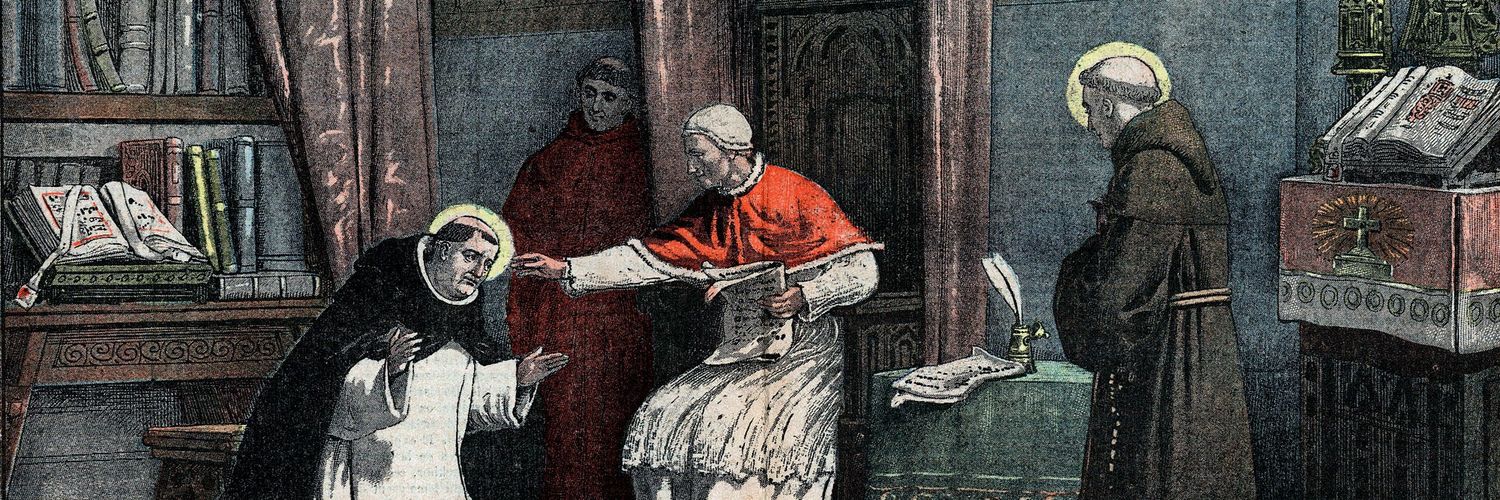
Haz 🇻🇦
@HazThomist
Roman Catholic. PhD student, theology. Thomist.
He who is the Creator of all things, being itself, has emptied Himself by assuming the poverty of our human nature so that we might in turn be divinised and sanctified by the grace merited by His superabundant atoning sacrifice.
Mike will vociferously deny that he is a magisterial positivist, but here is the proof. His wrong theory of Magisterium doesn't exalt the papacy, because it means that we don't accept the Pope's teachings because they are true, but because they are the policy currently in force.
um no
The first and most important reason to study theology is to become more intensively united to God. Not to become more knowledgeable, a better teacher, a better apologist, or to gain human approval and recognition. The end of sacred study is union of the soul with God.
"Without love, the Church may teach truth, but her teaching will be spiritually barren. Having a heart without knowledge, however, the Church will appear sentimental & unconvincing. Only the two together form a convincing coalition for union with God." Fr Thomas Joseph White OP
I'll stick with the Council of Quiercy: "There is not, never has been, and never will be a single human being for whom Christ did not suffer."
Christ died for whoever believes. Whoever does not believe is condemned already.
Christ died for all inasmuch as He rendered full atonement through the charity of the Cross for the sins of all (objective redemption). But only those who cooperate with the grace of Christ and have the fruits of His passion applied to them will be saved (subjective redemption).
Christ died for whoever believes. Whoever does not believe is condemned already.
The Catholic doctrine of the universal destination of goods does teach that each human person has a right to the basic needs of existence. Clearly how to achieve this is left up to prudential estimation. But abolishing all welfare is certainly impermissible.
And for the Catholics who insist that the welfare state is somehow divinely mandated by our religion, please explain how Catholic countries existed for 1,900 years without welfare states but were still Catholic.
God could have saved man in many ways. He could have saved us per solum voluntatem by merely willing our salvation. The Incarnation was not strictly necessary, and neither was His copious suffering. Yet He chose to redeem us in this way out of the infinity of divine love & mercy.
The monasteries in Catholic England provided a kind of proto-welfare state by caring for the poor. The dissolution of the monasteries by Henry VIII led to a major social crisis and mass pauperisation. One of the worst tragedies in English history.
The sanctifying grace a baptized Christian in a state of grace possesses, is the seed and beginning of the future glory we will one day possess in full.
“Earlier, we noted the difference between the education of the infused virtues and the natural virtues… this education [of the infused virtues] is indispensable. It is quite true that, by God’s gift, a little Christian child from the start possesses (indeed in a superior state)…
Pray for Trent Horn’s wife who was diagnosed with cancer.
the left has abandoned economics in favour of social liberalism, and the right has abandoned social traditionalism in favour of economic liberalism. this is why Catholics (and many non-Catholics with similar views) are politically homeless.
“Oh, so you’re right-wing? Name every Lana Del Rey song.”
Me running to get in line for confession before the 60 year old lady at 3:00 pm on a Saturday afternoon x.com/FeelsGuy2003/s…
Pope Leo calls for an end to 'barbarity' in Gaza.
One of the best introductions to the spiritual life in the Thomistic tradition. It's lucidly written and explores the topic in considerable depth while remaining introductory. The more knowledgeable reader will appreciate the abundant footnotes that help to deepen understanding.
Fr Thomas Joseph White OP, rector of the Angelicum, and imo one of the best living Dominican theologians, has a new book out on the spiritual life in the tradition of St Thomas.